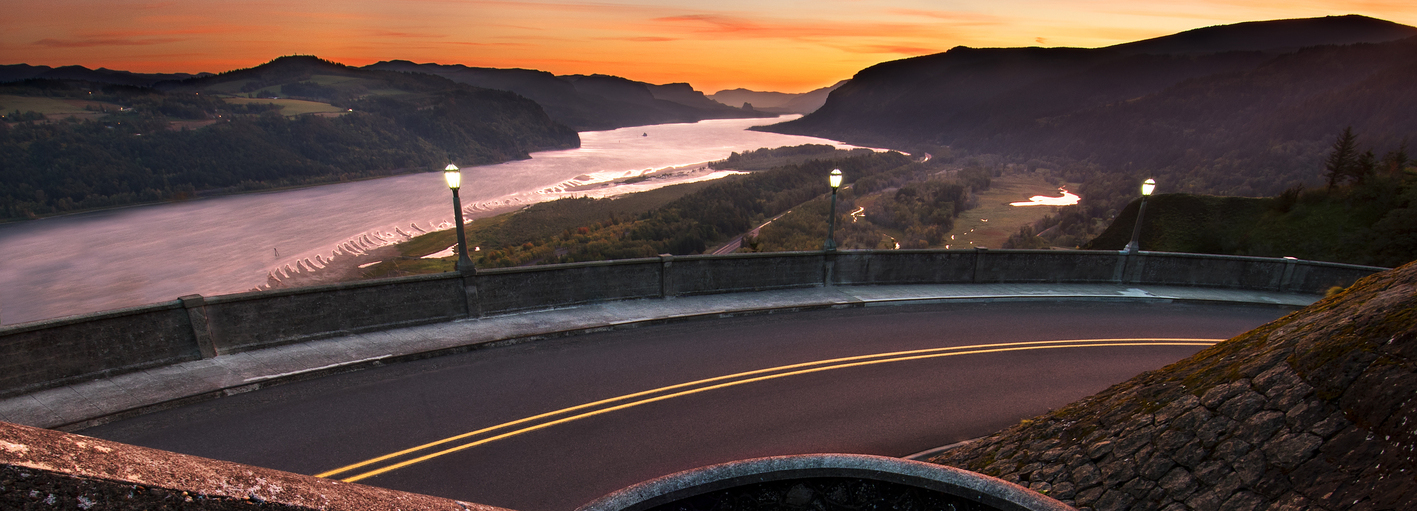Network Director, Columbia Gorge Tourism Alliance
I’m raising my hand as a bona fide Gorge local in support of the seasonal, timed-use permit system for personal vehicles along a congested stretch of the Historic Columbia River Highway, which will run 9 a.m.-6 p.m. between Interstate 84 exits 28 and 35 from May 24-Sept. 5.
I know, I know. I’ve read the comments sections of articles about the incoming system that have been posted over the past few months and I know that a significant number of Gorge recreationists disagree with me, some strongly, on this. But I’ve had the chance to work on and think about the issues over the past few years that went into the design of this system and want to share a few thoughts.
Memories of a Gorge upbringing
Growing up in the Gorge, I took my home for granted and didn’t hike (not willingly, anyway) until my twenties. As a kid, my dad used to drag me out into the woods, usually on old logging trails, where I begrudgingly trudged along behind him. I remember in third grade, when he bought me hiking boots, thinking they were "ugly boy shoes" because this was long before the sports apparel companies focused on the outdoors.
Despite my complaining, there were things I ended up loving on our nature walks: tiny wild strawberries, cornflowers, grasshoppers, spending time with Dad, and that feeling of accomplishment back in the truck on the way home.
Later, when I started hiking with my friends, it was easy to find empty trails and parking lots. By then I had lived in other parts of Oregon and was able to compare with and soak in the beauty of the Gorge. I discovered that magical ability of nature to shift your perspective and put things in their right place. I took pictures and, when I moved away, hung them on my walls to remind me of home.
That was before we became a destination.
Welcoming visitors while protecting the Gorge
Sometimes it feels like the Gorge was a celebrity we were friends with back in the day, when no one else noticed her. We loved her long before everyone else suddenly recognized her beauty, wisdom, and craft-brewing skills. Back then we were able to see and talk with her whenever we wanted, but now she has big crowds around her all the time.
A few years ago, just before the pandemic, I began to work with people who are focused on finding solutions that address these crowds and look for ways to enhance our communities while also protecting our region. One example is readysetgorge.com, a resource for visitors to access before they arrive with information on how to be safe in the woods. And gorgefoodtrails.com which supports our local food system and pulls people further east to spread out the crowds. Or gorgepass.com which works to make it easy for visitors to explore without their personal vehicles.
Because really, the biggest problem is the sheer number of these vehicles. Full lots at trailheads, lined up along the sides of narrow roads, randomly blocking or sticking out where no car should be. This is why I feel the new timed access permits are a good thing. They have the power to not only make things safer but to help break up the congestion so that we can all have access.
By the way, no one is making money off the permit fees. The $2 cost goes solely to pay for the recreation.com reservation system. It doesn’t even cover the cost of the flaggers who help make everything flow, or the ticket-takers who will take the brunt of the frustration, especially those first few weekends. Those poor people will most certainly deserve extra kindness.
Shared experiences
There are many in the Gorge who say the visitors should be simply kept out. Even if that were possible, my first thought goes to the Oregon Coast. Have you ever popped over for the day or stayed over and felt the magic of walking along a stormy beach? The North Coast communities are experiencing similar visitation issues as we are in the Gorge but certainly we don’t want to be shut out of that experience.
I think it’s pretty natural to feel protective of where we grew up. To want to keep it to ourselves. But for me, there’s also a stronger urge I have to share the experience with others. Everyone should be able to know that awe and shift of perspective. If everyone got to know the Gorge this way, the world would be a better place.
So, yes, I feel like the permit systems are an equitable way to deal with the crowds and safety issues. But it also feels like it gives me an experience I haven’t had in several years: instead of sitting in a traffic jam, it allows me to schedule quality time to go on a drive with my old friend the Gorge.
Emily Reed is the network director for the Columbia Gorge Tourism Alliance, a network of regional leaders dedicated to developing the Gorge as a world-class, sustainable tourism economy. A creative strategist with 25+ years of experience working on over 150 different brands, Emily has worked with an array of leading public, private, and nonprofit sector organizations from Nike to the Bonneville Power Administration. She is passionate about community service: Emily was a co-founder of the Mosier Farmers' Market and served as Mosier City Council President from 2012-20.

